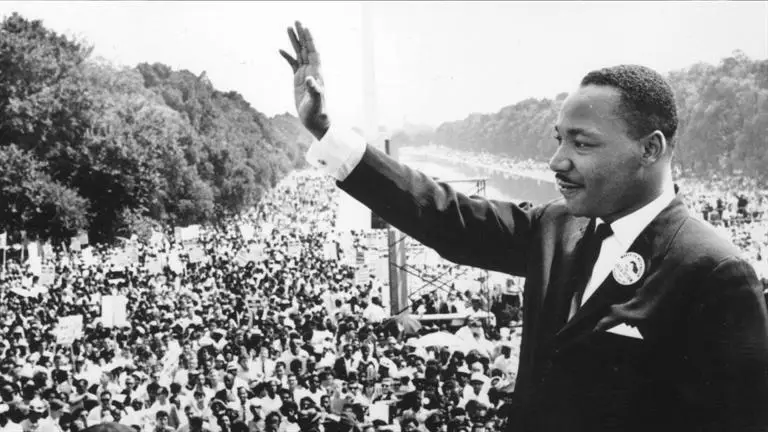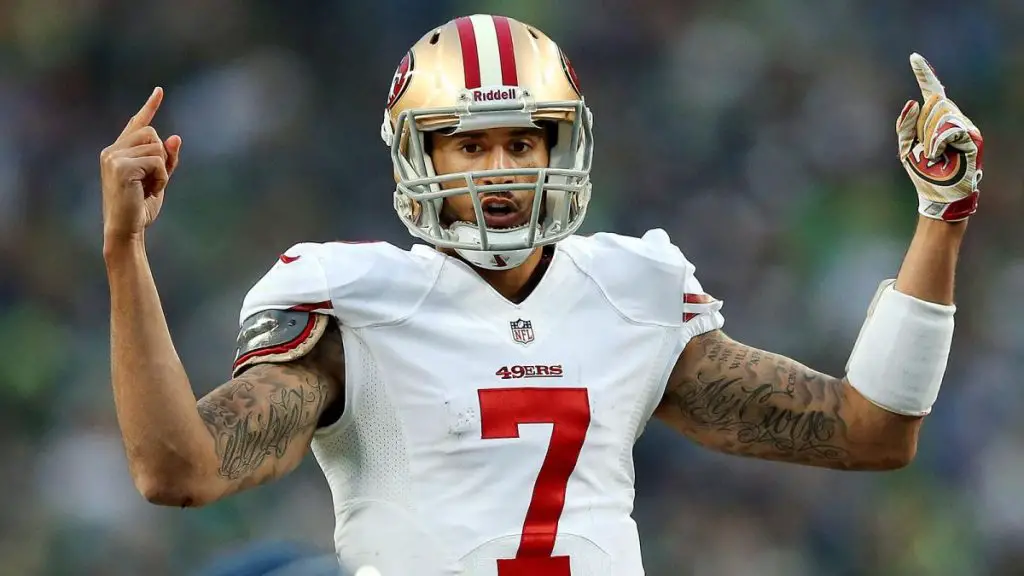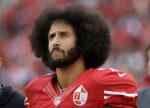“All we say to America is: Be true to what you said on paper. If I lived in China or even Russia, or any totalitarian country … Maybe I could understand the denial of certain basic First Amendment privileges, because they hadn’t committed themselves to that over there.
“But somewhere I read of the freedom of assembly. Somewhere I read of the freedom of press. Somewhere I read that the greatness of America is the right to protest for right.”
It was almost 50 years ago that a person greater than most Americans uttered those famous words. These words were part of his last speech, some of the last few that we as a nation ever received from this great soul.
He was killed the next day, but that dream of his, which he spoke so fondly of in another famous speech of his, has lived on.
The man I am talking about is, of course, Martin Luther King Jr. And that dream of his never came true. It probably never will. But that doesn’t mean we shouldn’t continue to try.

What sets America apart as a nation? Its diversity and so-called “melting pot” is a fantastic thing, but we aren’t alone—there are many nations with a diverse population, where the color of your skin or the birthplace of your parents doesn’t determine your identity.
Is it our grand promise of unlimited social mobility? You know, the “American Dream,” the idea that no matter who you are, no matter your creed, race, religion, gender or political beliefs, you could make it in America; you could be who you want to be, you could get rich, you could live a great life.
Well, yes and no (more on the yes bit later). Social mobility’s pretty low these days, but you don’t even have to click those links to figure that out.
Is it our wealth that differentiates us? I mean, not really. Our country is the richest civilization in all of history. But that wealth doesn’t particularly mean much when our social safety nets for the most vulnerable are in tatters, and we apparently can’t even afford relatively obvious policies like universal health care — a policy adopted by 58 countries, by the way, and well on the way to adoption in several more.
The fact that we have such a fantastically large economy is pretty impressive — we definitely punch above our weight, with only 5 percent of the world’s population but 22 percent of its GDP. But we’re probably not always going to be the number one economy in the world.
What about our military, or our general cultural influence? They are rather mighty forces, I will admit, but they aren’t always good ones. We have an awesomely powerful army — the strongest in the world, by far — but it definitely hasn’t always been a force for good (one could even arguably say that the opposite has more often been true).
I absolutely respect and admire the service of our soldiers, the majority of whom went into the military for a variety of honorable, respectable reasons and served with dignity.
That respect is not contradicted by any condemnation of the military-industrial complex as a whole, or the actions of politicians and military administrators that perpetrated terrible deeds, however.
I do beam with pride when I see people all over the world using phones with American operating systems to watch American-made movies and television or listen to American made music. And it is pretty cool that Coca Cola and McDonalds have a presence in 200 and 119 countries respectively.
Until you remember some of the, err, nastier details that come along with that domination, like where the phones with those operating systems are made, or how those companies’ workers are treated, both domestically and abroad.
I don’t want to rag on us too much. America is a great country. I believe that with all my heart. But why?
Well, for me at least, it’s the “dreaming” bit of the American Dream that really sets us apart: Our collective determination to do better and be better. It seems to me that Antonio Gramsci’s famous line about “pessimism of the intellect, optimism of the will” might as well be America’s motto.
We can have slavery in the 19th century and have an African American president in the 21th century, but we can also acknowledge that more must be done to make good on the promises our Constitution laid out. We can accomplish truly remarkable technological wonders and feats, bettering not only our nation but helping the world in fantastical ways, while still always looking to do more.
Our dream, in theory, is an entirely inclusive one. But there’s a caveat. No matter how well we are doing, no matter how “great” we believe we are, there are always those that aren’t part of that grand old club of “greatness.” Our theoretical inclusivity is just that: theoretical. Even in the good old days that certain people like to talk about, huge segments of the population weren’t exactly getting their fair shake.
And that’s where we get back to MLK.
MLK was an American, a great American; one of the greatest, in fact. But why was he great? Was he great because he loved America? That’s part of it, sure. But he was great chiefly because he called it out.
When it waged an unjust war, he called it out. When it betrayed the spirit of the Emancipation Proclamation, he called it out. He reminded us again and again — this is not what we were meant to be. That as a nation we had had huge faults, and refused to fix them. That we had to confront the reality of things.
We had to understand that we hadn’t been true to what we said on paper.
So why the rant? Well, the hubbub over the Colin Kaepernick’s refusal to stand during the national anthem has made national and international headlines. People have called him a traitor and an embarrassment to his country, because he wouldn’t stand up during the national anthem. Is that unpatriotic, and if so, is being “unpatriotic” a crime?

Was MLK a traitor for accusing the American government of war-crimes in Vietnam? Hell, was Abraham Lincoln a traitor for saying that he wished for a time “Where America will once again be seen as the last best hope of earth”? What about RFK, who readily confronted America’s failure to provide for all? What about Frederick Douglass?
He passionately wrote:
“In thinking of America, I sometimes find myself admiring her bright blue sky — her grand old woods — her fertile fields — her beautiful rivers — her mighty lakes, and star-crowned mountains. But my rapture is soon checked, my joy is soon turned to mourning.
When I remember that all is cursed with the infernal actions of slaveholding, robbery and wrong—when I remember that with the waters of her noblest rivers, the tears of my brethren are borne to the ocean, disregarded and forgotten, and that her most fertile fields drink daily of the warm blood of my outraged sisters, I am filled with unutterable loathing.”
I’m not saying that Colin Kaepernick is remotely in the same galaxy, let alone league, as those grand figures of history, and I’m sure he’d agree. He’s just doing the right thing. Let me tell you why.
You aren’t a traitor for calling out America on its hypocritical bullshit, and being in such a privileged place like Kaepernick allows him to do just that.
You aren’t a traitor for refusing to embark on a prideful display of patriotism if you aren’t feeling patriotic. Hell, you aren’t a traitor for not being patriotic. You can be a patriot and you can be critical. You can dislike America and still feel American.
This isn’t some zero-sum game. You can (and definitely should!) call out our Founding Fathers on the hypocrisy of slavery without feeling like you’re besmirching the entire nation.
Indeed, there shouldn’t be anyone in our country above such criticism; I don’t see how that is at all compatible with our desire for greatness. We should know that we are better than our forefathers, but we should also know that our descendants will look to our actions with the same shame we sometimes feel.
And look, our national anthem, as catchy a tune it is, has some rather unpleasant history behind it.
I do think some criticism of it is overblown — it doesn’t glorify war, I believe, so much as it glorifies the foundational myth that America was and is meant to be and wasn’t going to go anywhere. All nations have their foundational myths; America’s, in many ways, was pretty destructive, but it isn’t alone there.
But I do understand the commentary surrounding the fact that, yeah, there are verses in our national anthem that straight up praise our killing of a bunch of liberated slaves as part of a war that we started in an act of aggression.
There’s a bit more nuance to it, as the British weren’t exactly innocent in the conflict and they certainly weren’t a bunch of egalitarians, regardless of their dismantling of the slave trade network; they built their Industrial Revolution off the backs of cotton pickers in the antebellum South, after all. But let’s not kid ourselves here. The song is problematic.
I’m not saying we should replace it. I’m not saying we should start burning flags. I’m not saying that I hate America. I’m not trying to be a downer by diving into our dark history.
But let’s not skirt around the topic: We have had a dark history full of some pretty terrible things, full of actions that hurt our own people and people half-way across the world from us. And much of that violence continues today.
But we are, or rather, we should be, unique in our willingness to confront that darkness. In our willingness to admit our imperfections, as Obama so elegantly put:
We’re not done perfecting our union, or living up to our founding creed — that all of us are created equal and free in the eyes of God.”
We should be willing to say that America ought to be something else, because the grand ideas we were told as kids shouldn’t just be pie-in-the-sky dreaming, but a reality that we can accomplish.
We should be inclusive of everyone. Did we learn nothing from the McCarthy era, or hell, even the modern era? Do you think Colin Kaepernick is wrong? That’s fine, there is some fair criticism to be made of his actions. Others would disagree with you.
But calling him a traitor, besmirching him for his Constitutionally sanctioned rights despite his legal actions is an absolute aberration. And that’s not the nation we should be. That’s not the nation that some of the best Americans who ever lived wanted us to be.
Look. We haven’t been true to what we said on paper. But we should. And one day, with a bit of work, perhaps we will. That’s the real beauty of America.

















